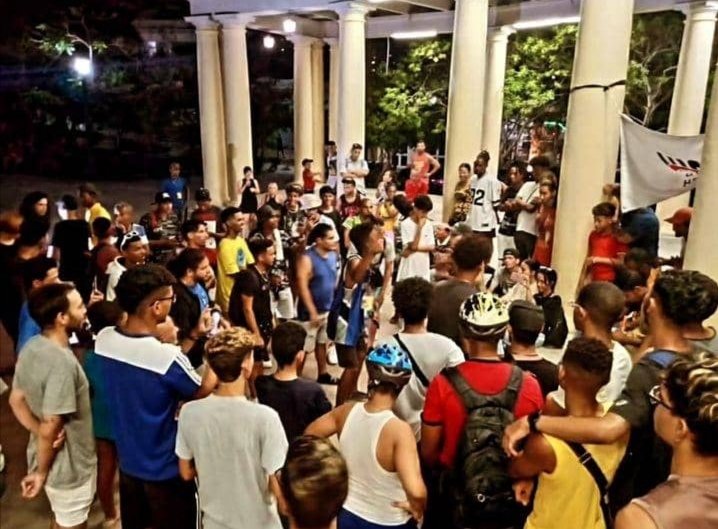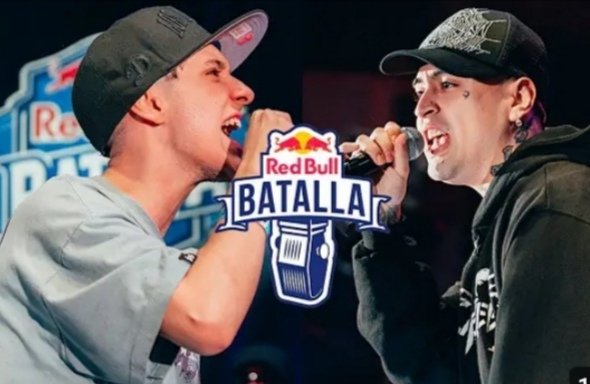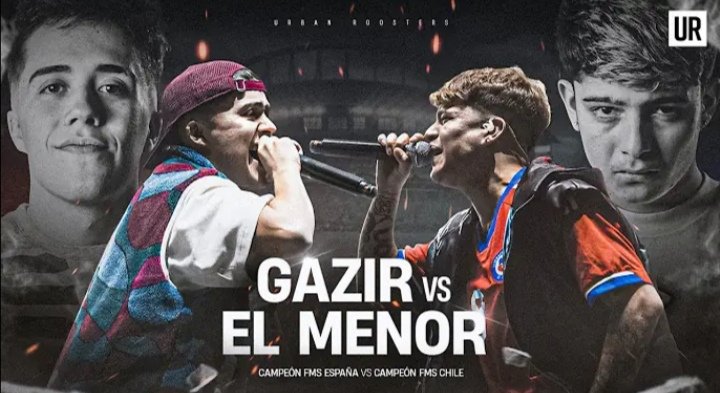
Since rap battles reached their peak of popularity following the phenomenon of the movie 8 Mile and the events organized by Red Bull, a lot of time has passed (more than 20 years). Over the years, different formats and events have been developed, whose purpose in most cases was to provide a good show and also showcase the skills that the rappers were gaining. For this reason, the environment of the battles changed from being merely an act where the attempt was to improvise over a rap beat with lines to try to ridicule the opponent to becoming an exhibition where the metric of the verses, the flow, the wit, the staging, and whatever elements the judges consider as points of comparison among the freestylers are measured.
Desde que las batallas de rap alcanzaron su pick de popularidad a raíz del fenómeno de la película 8 millas y a los eventos organizados por Red Bull ha pasado mucho tiempo (más de 20 años). Con el correr de los años se fueron desarrollando diferentes formatos y eventos cuya finalidad en la mayoría de los casos era dar un buen espectáculo y por otro mostrar las habilidades qué iban ganando los traperos. Por esta cuestión, el entorno de las batallas paso de ser meramente un acto donde se intenta improvisar al tiempo de una base de rap frases para intentar dejar en ridículo al rival. A ser una exhibición donde se mide la métrica de los versos, el Flow, el ingenio, la puesta en escena y cuanto elemento los jueces consideren que sea punto de comparación entre los freestylers.
In this highly competitive environment where more and more events were arising, sponsorships appeared, a reason that evidenced how "in-demand" improvisers had become. For this reason, the professionalization of Freestyle did not take long. For the first time, rap battles had become a way to make a living with improvised art, and for this, the emergence of Urban Roosters on the scene was vital (at least in the Hispanic world), as well as the leagues that began to establish FMS (Freestyle Master Series) in various countries. But with professionalization came sportsification because it was more than just an event held once a year where gaining prestige was more important than economic profit. Now freestyle was the means by which many rappers in the circuit brought home the bread.
En este entorno tan competitivo donde cada vez surgían más eventos, aparecieron los patrocinios, razón que evidenciaba lo “cotizados” que se habían vuelto los improvisadores. Por esta cuestión, la profesionalización del Freestyle no se hizo esperar. Por primera vez las batallas de rap se habían vuelto una forma de ganarse la vida con el arte improvisado, para esto la aparición de Urban Roosters en el panorama fue vital (por lo menos en el mundo hispano), así como las ligas qué comenzaron a instaurar por varios países FMS (Freestyle Master Series) por sus siglas en inglés. Pero con la profesionalización vino la deportivización, porque ya era más que un evento celebrado una vez al año donde se ganaba más prestigio que veneficio económico. Ahora el freestyle era el medio por el que muchos raperos en el circuito llevaban el pan a casa.
This issue brought with it: Now more than ever, winning a battle was becoming a matter of vital importance. Leagues started implementing a voting system to try to be as fair as possible, measuring a series of parameters that they considered noteworthy, preestablished in a scoring table that gauged the "quality" of the rhymes (or rather the verses) pattern by pattern. Thus, freestylers, by taking on this scoring system as the parameters for winning or losing a battle (which, we must remember, was similar to having economic stability or not), began to transform their art according to the scoring system. Just as training routines started to be created, coaches emerged, personalized ones, freestyle schools were established, the methods of voting started to be studied in an attempt to reach peak performance and more, all trying in a way to keep up with this new environment that began to prevail in the world of Free.
Esta cuestión trajo consigo qué: Ahora más que nunca ganar una batalla se volvía un hecho de vital importancia. Las ligas comenzaron a implementar un sistema de votación para intentar ser lo más justas posibles, midiendo una serie de parámetros que consideraban destacables, preestablecidos en una tabla de puntuación que media la “calidad” de las rimas (más bien los versos) patrón por patrón. Así los freestylers al asumir este sistema de puntuación como los parámetros para ganar o perder una batalla (cosa que recordemos era similar a tener estabilidad económica o no) comenzaron a mutar su arte en función del sistema de puntaje. Así como se empezaron a crear rutinas de entrenamiento, surgieron entrenadores, personalizados, escuelas de freestyle, se empezaron a estudiar las forma de votación para intentar dar con la forma de alcanzar el rendimiento máximo y más, todo intentando de cierta forma estar al día con este nuevo entorno qué compenso a imperar en el mundo del Free.
As expected, this led to varied consequences because while more and more skillful rappers began to appear in these formats, on the other hand, competitors emerged who focused more on score battles rather than rap battles, strictly adhering to what was being evaluated and leaving the art itself somewhat aside. This situation increasingly became evident to the spectators (who, in the first place, kept the leagues afloat by buying tickets or through digital platform views), as they attended these events seeking entertainment and many times what they found were insipid battles where the main goal was not to excite the audience (as an artist would seek) but to achieve the highest score with each performance (something more akin to sports). This undoubtedly caused a decline in interest in professional Freestyle, leading to more attention being paid to other competitions where art or entertainment would be prioritized over formats and scores.
Esto como es de esperar trajo consecuencias variopintas porque si bien cada vez más comenzaron a aparecer raperos más habilidosos en estos formatos, por otra parte, aparecieron competidores que más que batallas de rap hacían batallas de puntaje, apegándose estrictamente a lo que se evaluaba y dejando el arte en sí un poco de lado. Situación que cada vez más se hizo evidente para los espectadores (quienes en primer lugar mantenían las ligas a flote comprando entradas o por medio de las visualizaciones en plataformas digitales), ya que iban a ver estos eventos buscando espectáculo y muchas veces lo que encontraban no pasaban de ser batallas insípidas donde más que hacer vibrar al público (como buscaría un artista) se buscaba obtener la mayor puntuación con cada actuación (cosa más apegada al deporte). Esto sin dudas hizo que el interés por el Freestyle profesional decayera y se empezará a prestar más atención a otras competencias donde se priorizará el arte o el espectáculo por encima de los formatos y las puntuaciones.
As a result, the leagues have increasingly tried to evolve towards formats that bring back that "magic" of Freestyle that was being lost (and thus regain viewership of course). As for the initial question of whether this discipline is more art or sport, we could say (like most things in these times) the answer is subjective. It will depend on the competition or event in question and, more than that, on the current public preference and profitability for organizations and Freestylers.
A raíz de esto, las ligas cada vez más han intentado mutar hacia formatos qué traigan de vuelta esa “magia” del Free qué se estaba perdiendo (y así recuperar espectador claro está). En cuanto a la interrogante del principio si esta disciplina es más arte o deporte, podría mos decir (que como la mayoría de las cosas en estos tiempos) la respuesta es subjetiva. Va a depender de la competencia o el evento en cuestión y más que eso, del gusto del público que impere en ese momento y la rentabilidad para las organizaciones y los Freestylers.
Translated and formatted with Hive Translator by @noakmilo.



Sinceramente el Freestyle cuando se hace algo cotidiano empieza a perder magia. El formato de La batalla de gallos que era una vez al año es el mejor para este estilo.